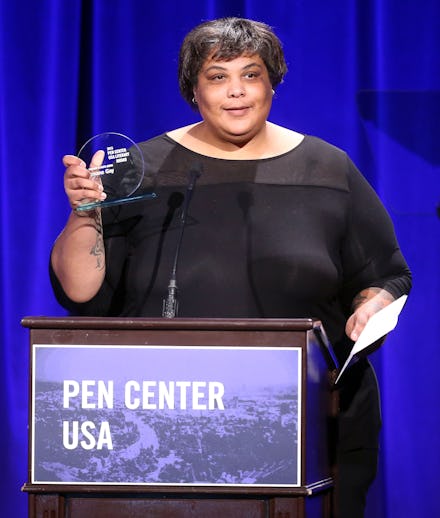Roxane Gay's 'Hunger' is a confession, a learning experience and a revelation

Most memoir writing involves a little sleight-of-hand on the part of the writer — a flourish here or there to keep some other, more uncomfortable truth hidden — because someone can only be expected to be so self-aware or unself-conscious. Many of us hardly trust our loved ones with our most intimate selves, so scared are we of rejection, that trusting an audience of strangers with all the most painful truths of our existences can feel too much to bear.
Author and New York Times columnist Roxane Gay pulls no such punches in her new memoir, Hunger: A Memoir of (My) Body (HarperCollins), which was released on Tuesday. From listing her weight at her heaviest, to describing a gang-rape by several classmates at age 12, her many attempts to lose weight and often-conscious decisions to put it back on, her "lost year" after trying to run away from her unresolved trauma and the academic pressures of Yale, Gay bares more than any reader would have any right to expect. And that's before she gets into the varied personal losses of her adult years, as well as talking about the many, daily, physically painful indignities that significantly overweight people are expected to endure in silence as a price of their alleged physical non-conformity.
"Writing this book is a confession," she writes in the second chapter — and, as any Catholic knows, confession is for the good of your own soul, not for the edification or titillation of other people. "This is my truth."
Long-time Gay fans (of which I am one, in addition to having been her editor at The Guardian and having assisted on an upcoming project of hers) will recognize some of the more recent anecdotes from her occasionally prolific Tumblr, where early versions of her adventures with Blue Apron, pink nail polish and breaking her ankle first appeared. But their familiarity out of context of the rest of her life makes them no less interesting when returned to a more (im)perfect whole.
And readers of her breakout essay collection Bad Feminist (HarperCollins) can hardly miss the ongoing reflection of what it means to be an imperfect vessel for a sociopolitical movement. Gay discusses knowing that she ought not to hate her body as much as she does, and yet she struggles to accept that she is worthy of love and understanding, regardless of her size. "It would be easy to pretend I am just fine with my body as it is," she writes. "I (want to) believe my worth as a human being does not reside in my size or appearance."
"What I know and what I feel are two very different things."
Gay, who has become known for her stripped-down prose, breaks the book into six untitled sections, with short, numbered chapters that feel like the literary equivalent of jump cuts at certain points — particularly at the beginning — mirroring the flashes of memories that she describes intruding on her own life. It's a captivating, even modernist departure from the traditional, composed chapters of many other memoirs or the recent, and possibly Bad Feminist-inspired, movement toward essays-as-memoir. Like Gay herself — or anyone who has lived her life only to run, almost unexpectedly, into and then beyond 40 — you get to her 40s almost wondering where the years went, even though readers experience them with her.
And no review (no matter how ill-prepared the reviewer) would be complete without grappling with the book's perspective on race: Gay explores both her Haitian and Midwestern roots, and how the interplay between the two, her gender and her size have influenced her relationships, friendships and the opportunities she has had access to. Her rapists, she writes, were white and viewed her black child's body as disposable; her classmates at her private boarding school, Exeter, didn't see her as an academic threat, so unable were they to see beyond her physical size or her race. She talks about feeling more visible as an overweight person in New York and Los Angeles than back home, and more "scary" in her blackness to white people, the more proximate to urban areas she lived.
And yet, the New York Times best-selling author has succeeded beyond almost anyone's wildest dreams, despite the meanest assumptions anyone's made about her.
That's the thing: Being a woman, you learn that people will assume that you're somehow less smart on average than men; being fat, you learn that people will assume that you're less smart on average than thin people; being a person of color, you learn that people will assume that you are less smart than white people. But Roxane Gay is a woman, and she is fat, and she is black, and she is smarter and more capable and more lovable than almost anyone (except, as she says, her beloved parents) has almost ever given her credit for — even, some days, herself.
After she breaks her ankle in 2014 and ends up in the hospital, she writes that she learned "something I've long pretended wasn't true, for reasons I don't fully understand ... I finally recognized that I matter to the people in my life."
But, as she says in the book, she is learning.
"I am learning to care less what other people think. I am learning that the measure of my happiness is not weight loss but, rather, feeling more comfortable in my body. I am increasingly committed to challenging the toxic cultural norms that dictate far too much of how women live their lives and treat their bodies."
So, hopefully, are the rest of us.